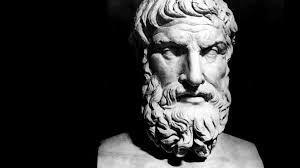Definition of EPICUREANS in PHILOSOPHY and CHARACTERISTICS

We rededicate one more lesson from a PROFESSOR, to the Epicureans and this time, we will give a definition simple term, and we will talk about the main characteristics of this philosophical school founded in Athens by Epicurus of Samos and which was given the name of “The garden”. Other representatives of Epicureanism were Diogenes of Enoando and Zeno of Sidón or the poets Horacio, Virgilio and Lucrecio. If you want to know more about the Epicureans in philosophy, their definition and characteristics, continue reading this lesson. We started!
Index
- Definition of Epicureans in philosophy
- Ethics, one of the characteristics of the Epicureans
- The physics of the Epicureans
- Epistemology of the Epicureans
Definition of the Epicureans in philosophy.
By Epicurean is meant that follower of the Epicureanism, that is, of the philosophical current that identifies happiness with pleasure, understood as the absence of pain. The ataraxia
, or imperturbability of spirit, will thus become his ideal, and the whole doctrine of Epicurus will be based on this idea and to that end it is directed, both on the ethical plane, on the physical plane, as well as on the epistemological.Two concepts will be fundamental in the Epicurean discourse: the pleasure and desire. The most important thing is to leave the suffering behind, and then pursue the pleasure. The Good, of which Socrates spoke, is a mere fiction. Only the achievement of pleasure is capable of making the human being move. And this is where philosophy comes into play, serving as an instrument to get to differentiate between the pleasures that are worthwhile.
It is about rationalizing the pursuit of pleasure, that is why, for Epicurus, the true pleasures are the intellectuals, betting on a control of physical pleasures. Otherwise, the individual will be lost in the search for it. The role of philosophy will, in this sense, be decisive: in the first place, it acts as a healer of the illnesses of the soul and later, as a teacher, who teaches the human being how to live. The mission of philosophy is, therefore, “Teach man to live pleasureAnd this will be the central axis of all of his ethics.
"That no one, while he is young, is reluctant to philosophize, nor, when he gets old, tire of philosophizing. Because, to achieve the health of the soul, he is never too old or too young ". Epicurus of Samos.

Image: Slideplayer
Ethics, one of the characteristics of the Epicureans.
Epicurean ethics is characterized by making a defense of the moderate search for pleasure, betting on the pleasures of the soul, compared to those of the body. For this, it is necessary, says Epicurus, to free oneself from everything that is superfluous, in order to live one's own existence, because there is true happiness. To do this, it is essential in the first place, to differentiate between the different types of desires, based on the different types of pleasures. For Samos, there are three, namely:
- Pleasures natural and necessary, which are the desires that free the individual from pain and suffering and which are related to basic needs such as food, health, protection ...
- Pleasures natural and unnecessary, like sexual desire or luxury. In the words of Epicurus, they are "sweet and flattering" wishes.
-
Pleasures neither natural nor necessary, products of social conventions or of the
hollow opinions, like the lust for power and wealth or the lust for immortality.
In addition, the pleasures, can be dynamic or static. The former are characterized by instantaneous satisfaction, but in the same way it disappears. This is the case, for example, of sexual desire. They are not easily controllable and tend to dominate the human being. The second are those that bring the individual to balance, and produce the elimination of suffering, and therefore, are the true pleasures.
"The limit of the greatness of pleasures is the elimination of all pain. Where there is pleasure, for as long as it lasts, there is neither pain nor sorrow, nor the mixture of both ". Epicurus of Samos.

Image: Slideshare
The physics of the Epicureans.
Another of the characteristics of the Epicureans is found in the conception of physics. As for the physics, Epicurus will say that, he is heading to end the fear of death and fear of gods, which according to him explains, are the main causes of the suffering of the individual. It is not so much about acquiring knowledge about the universe, as trying to understand it rationally, in order to achieve ataraxia, or the absence of all passion, which together with autarky and freedom, make up the main ideals of the Epicureanism.
“Freedom and anarchy are the greatest fruits of autarky ". Epicurus of Samos.
Thus, like Democritus, he will defend a materialistic and atomistic physics: the universe is eternal and is composed of atoms and emptiness. God did not create the universe. The gods, he says, go about their business, they have nothing to do with human beings. The fear of the gods is absurd.
“He who is blessed and immortal has no worries himself and does not cause them to anyone else, in such a way that he does not is subject neither to anger nor to benevolence: for all that is of this type is found only in what is weak”.
The fear of death, therefore, does not make any senseSince it is nothing more than the separation of the atoms, and once the individual is dead, there is no longer any sensation. Because when the human being dies, he is no more. So there is no point in worrying, because when death comes, it is no longer possible to feel pain or suffering.
“Death is therefore nothing to us; while we are here ourselves, death is not, and, when death is here, we are no longer ”.

Image: Slideplayer
Epistemology of the Epicureans.
Epicurus, as Aristotle, it is empiricist, defending that feeling is the foundation of all knowledge, and it is produced, by the impressions that the bodies provoke in the senses, and to which the human being can react in two ways: either by feeling pleasure, or by pain. These sensations generate feelings, and these are, for Epicurus, the foundation of morality.
The general ideas (not to be confused with Plato's ideas), are constituted from the repetition of a series of sensations, which are stored in memory, but must have sufficient clarity to serve as a foundation, otherwise, they would be wrong.
The senses, says Epicurus, are not capable of perceiving certain things, such as atoms, but thanks to the imagination, the human being is capable of inferring them.
If you want to read more articles similar to The Epicureans in Philosophy: Definition and Characteristics, we recommend that you enter our category of Philosophy.
Bibliography
Carlos García Gual, Emilio Lledó, Pierre Hadot. Philosophy for Happiness, Epicurus. Ed. ERRATA NATURAE, 2013.



